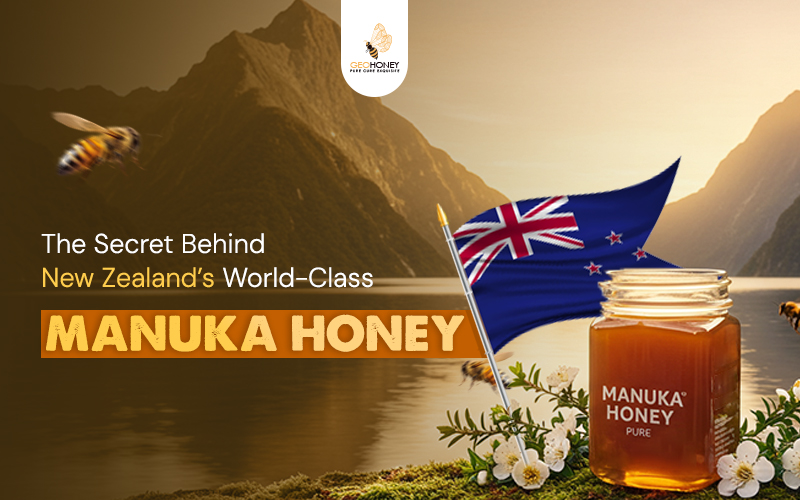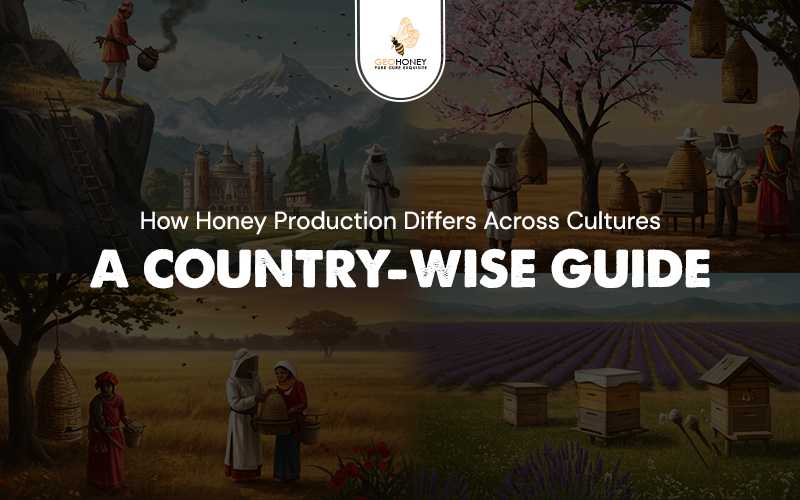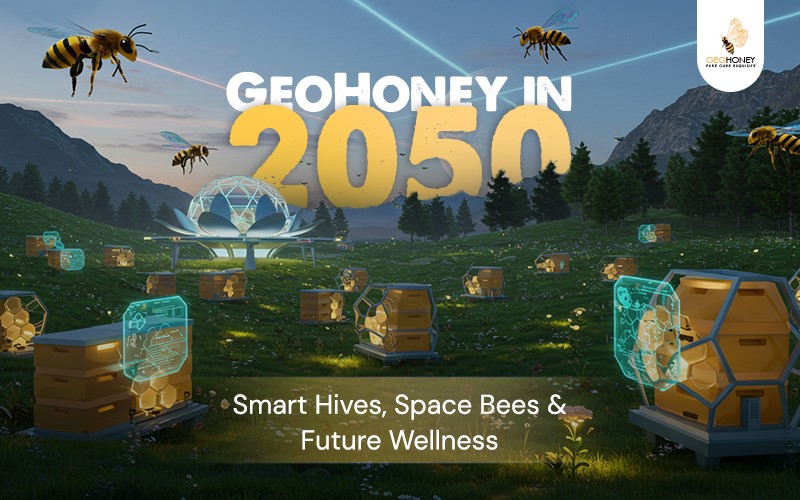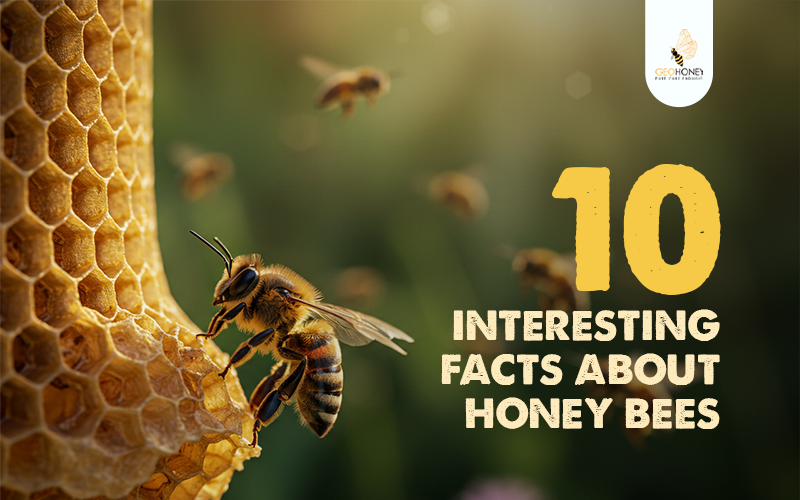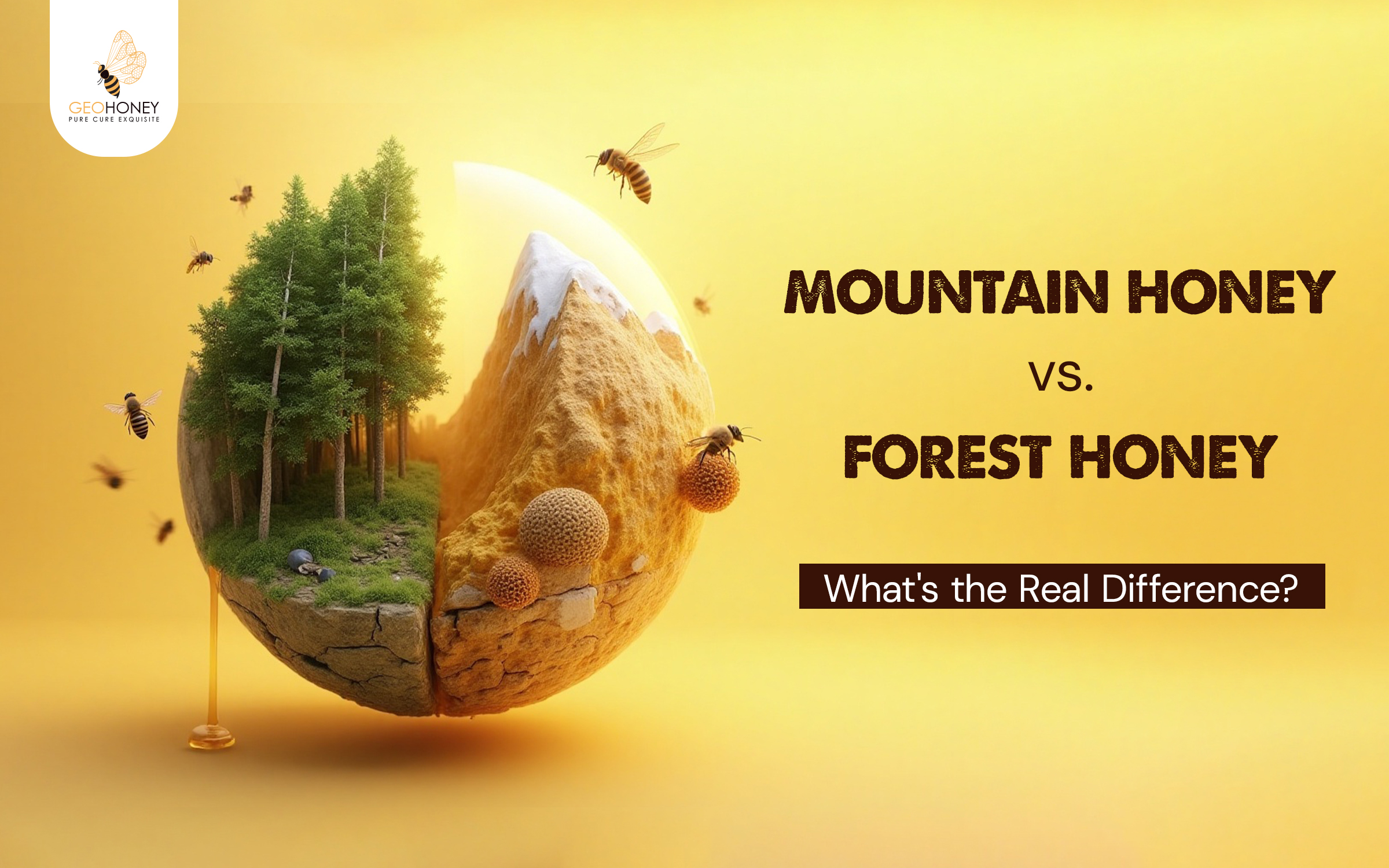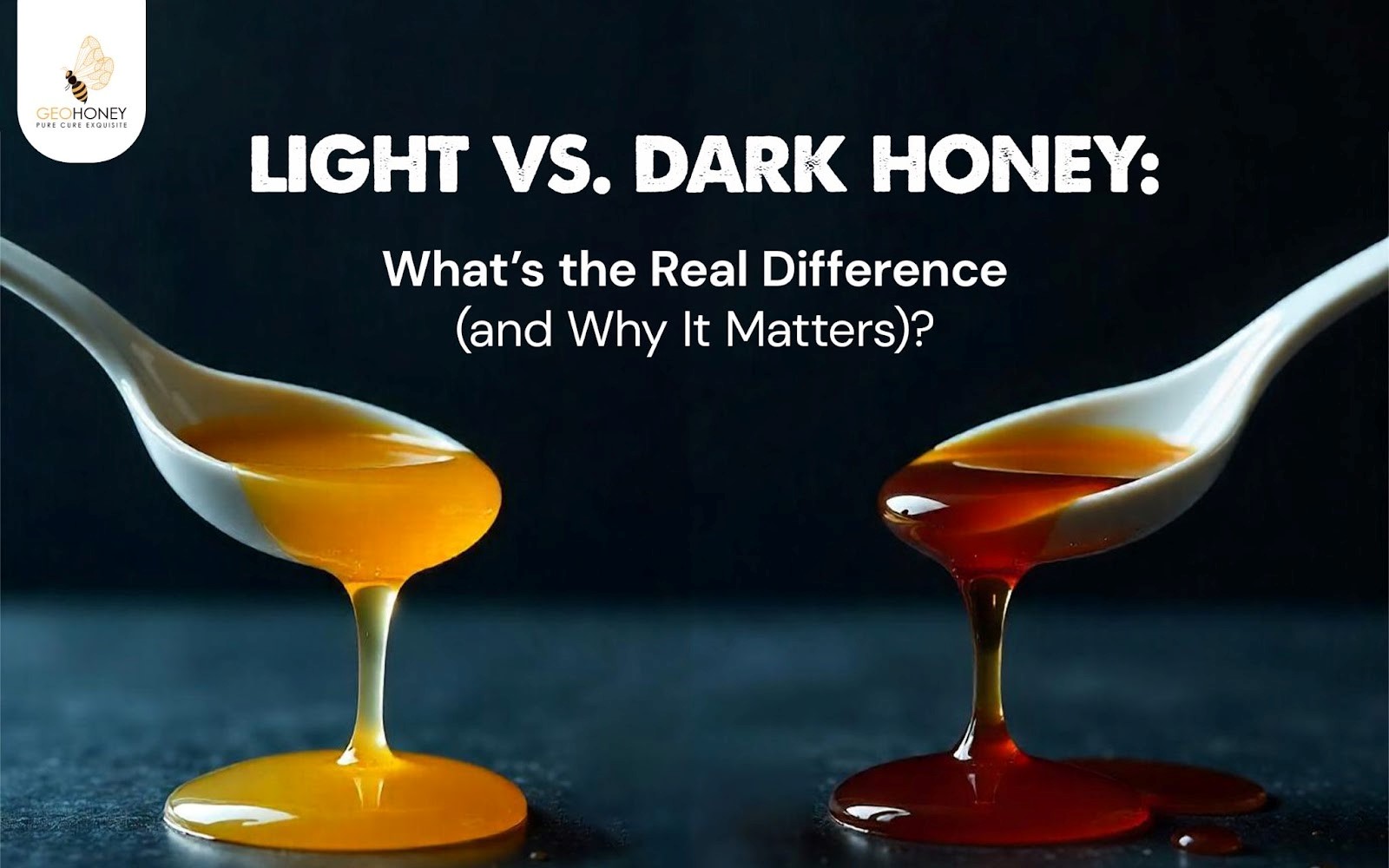- Tokyo: 11:50
- Singapore: 10:50
- Dubai: 06:50
- London: 03:50
- New York: 22:50
Our Blogs
Geohoney
The Secret Behind New Zealand’s World-Class Manuka Honey
New Zealand is the largest producer and exporter of the exotic Manuka Honey that is known globally for its rich flavor, impressive nutritional profile, and amazing benefits for your health and fitness. This purely organic honey is a superfood that can prove to be a valuable addition to your daily diet due to its high antioxidant, vitamins, minerals, and amino acid contents. “Manuka honey is a prized commodity due to its rarity and strong medicinal properties. No matter whether you are looking to treat seasonal illnesses or simply adopt a healthier dietary lifestyle, this honey variety is all you need.”, says the founder of Geohoney and the CEO of BA Barry Group, Mr. Basem Barry. This blog delves into the main factors that make New Zealand’s Manuka Honey so special. So, without any further ado, let’s uncover the secrets of this rare and unique honey variety together. Manuka Honey: A Unique Source, History, and Origin High Methylglyoxal (MGO) Content: The Discerning Quality of Manuka Honey The Unique Manuka Factor or UMF Effective For Wound Treatment Treats Diabetic Foot Ulcers Good for Oral Health Prevents Gastric Ulcers Enhances Digestive Health Reduces the Symptoms of Upper Respiratory Tract Infection There are many things that make Manuka Honey special. However, probably the most important one is its unique floral origin. This raw honey is made from the nectar of the Manuka tree or Leptospermum Scoparium tree that is native to the pristine and lush green landscape of New Zealand. This tree is found in the remote regions of the country where the air, soil, and water are free from pollutants and pesticides. A Historical View: The Maori Origin The indigenous Maori people of New Zealand had a deep connection with the Manuka Trees. They considered it the Taonga, meaning a prized natural treasure, which they used for countless culinary and medicinal purposes. They used wood from this tree to fashion weapons and its bark to make water containers. They also used its bark topically on wounds. These natives created herbal infusions from the leaves of the tree to treat colds, fevers, and digestive issues. The inner bark of the Manuka was also used by the Maori as a mouthwash and as a treatment for many gum diseases. Europeans Discover the Manuka Tree James Cook, in one of his journeys, came across the Maori people and discovered the magical effects of the Manuka Tree. He pioneered the use of the leaves of this tree as an alternative to tea. After that, many early settlers also started using this tree as a tea and as a key medicinal ingredient. The Rise of Manuka Honey In the 1800s, a Methodist missionary named Mary Bumbay introduced European bees to New Zealand. He established his apiary near the Manuka trees, which is probably the starting point of the production of Manuka honey on a larger scale. By 1860, many honey bee colonies appeared in New Zealand owing to its diverse natural landscape. Soon, the Maori people also learned honey farming methods to create their own Manuka Honey, and this led to the commercial production of this rare honey variety. Dr. Peter Molan, a biochemist from the University of Waikato, conducted research on the antibacterial properties of Manuka honey in 1980. He was the first to discover the unique nature and superior antibacterial activity of this honey, which he attributed to its high MGO content. This honey has a much higher MGO concentration than normal honey varieties, which is the main reason behind its superior antibacterial effects. This property of Manuka Honey makes it effective for enhancing immunity, treating wounds, and preventing both chronic and seasonal illnesses. Another special thing about this honey is the unique quality grading system that is used to rate this honey in terms of its purity, MGO content, and antibacterial properties. The UMF or unique Manuka factor was developed by the New Zealand UMF Honey Association (UMFHA) to determine Manuka Honey’s potency and purity. To calculate this value, several key compounds like methylglyoxal (MGO), leptosperin, and dihydroxyacetone (DHA) in this honey are measured. Higher UMF ratings like UMF 15+ or UMF 20+ indicate greater potency and health benefits of the honey. UMF 10+ rated honey is suitable for normal daily use. UMF 15+ Manuka Honey is ideal for targeted medicinal and health applications. UMF 20+ rate Manuka honey gives you maximum potency, and it is used mostly as an ingredient in medicinal and skincare products. Manuka honey has been used as a wound treatment for centuries. This highly dense and viscous honey creates a protective barrier on the wounds, which prevents microbial infections and facilitates quicker healing. Diabetic foot ulcers are a major issue for people who suffer from type 1 or type 2 diabetes. Diabetic patients who suffer from this issue can use Manuka honeybased wound dressing in combination with their regular treatment to heal the sores faster. This ensures the wounds are treated before they get worse. Dental plaque can be a big nuisance, which can lead to tooth decay and several gum diseases. These plaques are also a breeding ground for bacteria. Manuka honey fights the plaque-producing bacteria in your mouth, which enhances your oral health. The continuous use of this honey prevents the buildup of dental plaque, which ensures your oral health stays in the best shape. People who suffer from this issue can also enjoy the benefits of Manuka Honey. Stomach or peptic ulcers are also a common issue that can lead to indigestion, nausea, and heartburn. These ulcers are caused by helicobacter pylori bacteria in the stomach, which Manuka Honey can prevent from growing. The antibacterial properties of this honey fight harmful gut bacteria and soothe the lining of the stomach, which makes it ideal for treating and preventing gastric ulcers. This honey can also treat IBD or inflammatory bowel disease, which leads to the inflammation of the gastrointestinal tract. Symptoms of IBD include abdominal pain, diarrhea, vomiting, and nausea. The use of Manuka honey eliminates the root cause of the IBD, which is the presence of clostridiodes defficile bacteria. This way, by using Manuka honey, you can enjoy better digestive health without having to rely on traditional antibiotic treatments. Upper respiratory infection or UTI can lead to symptoms like Cough Acute nasopharyngitis Sinusitis Tonsillitis Tracheitis Rhinitis Supraglottitis The use of Manuka honey has proven effective for the treatment of most of these symptoms. This honey can soothe your throat and treat pulmonary irritation and persistent post-infection coughs. New Zealand’s Manuka honey has strong historical and cultural roots that date back several centuries. This rare honey made from the nectar of the Manuka tree (Leptospermum scoparium) possesses several unique properties that make it a perfect ingredient in many culinary and medicinal recipes. This honey’s unique properties include very high MGO content, greater microbial activity, high antioxidant concentration, and an impressive overall nutritional profile. These components of Manuka Honey are what make it effective for treating a wide range of illnesses and promoting long-lasting health and wellness. You can visit us at Geohoney to explore our wide range of pure and natural monofloral honey varieties that give you the sweetest flavor without any side effects. Manuka Honey: A Unique Source, History, and Origin
High Methylglyoxal (MGO) Content: The Discerning Quality of Manuka Honey
The Unique Manuka Factor or UMF
Effective For Wound Treatment
Treats Diabetic Foot Ulcers
Good for Oral Health
Prevents Gastric Ulcers
Enhances Digestive Health
Reduces the Symptoms of Upper Respiratory Tract Infection
Conclusion
Geohoney
What Role Do Bees Play in the Ecosystem
There are very few animal or insect species out there that are as important as bees when it comes to creating a stable and healthy ecosystem. Bees are the reason behind a stable global food supply, and their role cannot be understated when it comes to keeping humans and animals fed. Apart from that, these creatures also play an important part in creating a balanced ecosystem where every plant and animal can thrive. The founder of Geohoney and the CEO of BA Barry Group, Mr. Basem Barry, says, “Bees give us organic honey, create habitats for other animals, and ensure the crops around the world are able to grow on time and in abundance, which is why we cannot ignore the key role that they play in our lives both directly and indirectly.” This blog delves into the role that bees play in our collective ecosystem in detail. So, without any further ado, let’s see how these tiny creatures make this planet better every day. They Are the Top Pollinators They Facilitate Wildlife Habitats Bees Promote Biodiversity They Trigger the Growth of Wild Plants Bees Are Responsible for Global Food Security Economic Importance Common Threats That Are Leading to Declining Bee Populations Effective Ways You Can Protect the Bees The following are a few points that clearly show how honeybees support ecosystems around the globe. For a plant to germinate and reproduce, there must be a transfer of pollen from the male part, or anther of the flower, to the female part, or stigma. A very small amount of pollen reaches the stigma by wind and other means. So, how do we get this huge abundance of wildflowers and edible crops? The answer is, of course, the bees. About one-third of the world’s crop production depends on pollination by bees. Bees jump from flower to flower collecting nectar while also trapping pollen on their bodies and delivering it to the female parts of the flowers. Bees are responsible for pollinating about 30-35% of the world’s crops and about 90% of all plants that require cross-pollination to thrive. These busy workers pollinate billions of wild plants and agricultural crops, which is exactly what makes this keystone species an indispensable part of our ecosystem. Millions of insects and animals that live out in the wild have to thank bees for their habitats. The pollination by the bees is the main reason behind the growth of tropical forests, savannah woodlands, and temperate deciduous forests. Some tree species, like poplar and willows, also need pollination by bees to grow. All these locations serve as habitats for a wide range of fauna, ranging from small insects to birds to wild cats and elephants. In a world without bees, countless forest plants and trees will not be able to grow, and that will in turn destroy the food and shelter sources for billions of animals. This is why supporting wildlife habitat is probably among the most important roles that bees play in our ecosystem. Bees are the reason behind the creation of complex interconnected ecosystems scattered around the planet, where a diverse range of flora and fauna can thrive. By pollinating a wide range of wild flowers, bees directly sustain biodiversity, which is essential for every living organism on this planet that depends on other species for their survival and growth. Since biodiversity is among the main indicators of the health of an ecosystem, and bees play a big role in sustaining biodiversity, we can say that their contribution to our ecosystem is a lot more than we give them credit for. About 80% of all wild flowering plants in the world are dependent on pollination by bees. It is with pollination that flowers produce seeds, which lead to the growth of new plants and floral landscapes in the wild. These wild plants are used by other species as food, shelter, and nests, which are essential for their survival. As mentioned before, bees create about one-third of the total crops globally, and they support the growth of flora that animals feed on. These animals, in turn, serve as a source of food for other animals and humans. Thus, bees both directly and indirectly ensure global food security. According to the Food and Agriculture Organization (FAO) of the United Nations, about 75% of the edible crops and 35% of the total agricultural land of the world depend on bees. Bees produce raw honey that humans have been using for thousands of years as food and medicine. Apart from humans, other creatures like birds, raccoons, and bears also raid beehives to get the sweet and nutritious golden liquid. Bees are themselves a part of the food chain, which is another way they ensure food security in the ecosystem. Many species of birds, spiders, praying mantises, and dragonflies prey on bees. Apart from the regular ecosystem, the economic ecosystem of the world also heavily relies on honeybees. Estimates suggest that bees and other pollinators contribute more than $217 billion annually to the global economy. The bees produce honey, honeycomb, royal jelly, beeswax, and bee pollen, which are used in a wide range of industries, including food and beverages, cosmetics, and pharmaceuticals, to name just a few. Without bees, all the industries that rely on these raw materials will soon collapse, leading to severe economic consequences for the entire globe. Bees are more important for our ecosystem and biodiversity than we think. These industrious creatures labor day and night to pollinate our crops and provide us with honey. Bees create a sustainable ecosystem by allowing diverse flora and fauna to thrive in their natural habitats. Our global food supply and overall planet health rely heavily on bees. This is why we need to make sure these valuable insects do not decline in population due to our activities like deforestation, high pesticide usage, pollution, and climate change. This is the only way to ensure our ecosystem stays healthy for the years to come. You can visit us at Geohoney to check out our wide range of pure, raw honey products and learn more about honey bees and beekeeping from our blog here. They Are the Top Pollinators
They Facilitate Wildlife Habitats
Bees Promote Biodiversity
They Trigger the Growth of Wild Plants
Bees Are Responsible for Global Food Security
Economic Importance
Conclusion
Geohoney
Climbing for Liquid Gold: The Secret of Himalayan Honey
The Himalayan Mountain range spans across five countries, including India, Nepal, Bhutan, China (Tibet), and Pakistan, covering an area of 1,500 miles. This mountain range is known for its unparalleled natural beauty and a wide variety of flora and fauna.
Among many authentic natural products that hail from this region, the Himalayan Honey is probably the most famous. Mainly sourced from the high cliffs of Nepal, this honey is believed to have hallucinogenic effects which is what gives it the name “The Mad Honey”.
The founder of Geohoney and the CEO of B A Barry Group, Mr Basem Barry, says
“Himalayan honey is extracted and processed using age-old traditional techniques, which gives it a superior flavor, aroma, and countless health benefits.”
This blog uncovers the secrets of the exotic Himalayan organic honey in detail. It highlights what makes this honey historically and culturally significant, so keep on reading till the end.
Himalayan Honey: Origin and Source
Himalayan Honey: Cultural Importance
Nutritional Value of Himalayan Honey
Himalayan Honey Harvesting: Climbing for Liquid Gold
Health Benefits of Himalayan Honey
Himalayan Honey: Origin and Source
The high-altitude and very cold Himalayan climate is home to the world’s largest bee species, called the Giant Himalayan Bees, scientifically known as Apis laboriosa. These bees make hives on the high Himalayan cliffs, which honey hunters access using special tools and climbing methods. This makes honey harvesting quite labor-intensive and risky.
These bees live and forage in the high altitude of the Himalayas, where only a few rare and exotic flora can thrive. The Himalayan honey is made from the nectar of rare plants like the Rhododendron and some wildflowers that nestle among the towering Himalayan peaks.
The Himalayan raw honey holds special significance in the Himalayan region for its superior psychoactive and medicinal properties that result from its impressive nutritional profile and high Grayanotoxin content.
Himalayan Honey: Cultural Importance
Many indigenous groups and communities living in the Himalayan regions have been using this honey in religious rites and traditional ceremonies for centuries. The natives believe that this honey has the power to make you grow both physically and spiritually.
The hallucinogenic effects of the Himalayan honey facilitate transcendent experiences and enhance the effectiveness of meditations. Some Himalayan cultures present this liquid gold as an offering to their deities. This honey is also consumed during major religious festivals, where it is believed to create a sense of oneness with the universe.
Many Himalayan cultures have been incorporating it in remedies and syrups to treat respiratory and gastrointestinal issues for hundreds of years. This Grayanotoxin-rich honey thus holds special culinary, cultural, and religious significance for natives in the region.
Nutritional Value of Himalayan Honey
Himalayan Honey has so many benefits for your physical and mental well-being. These benefits are the direct result of the impressive nutritional profile of this honey.
This honey is rich in natural sugars, antioxidants, and minerals like iron, potassium, and calcium. This honey also contains beneficial enzymes and gut bacteria that facilitate digestion and lead to a healthier gastrointestinal system.
This honey contains Grayanotoxins that help relieve stress and improve your mood. This honey also contains trace amounts of protein and vitamins B and C.
Himalayan Honey Harvesting: Climbing for Liquid Gold
Himalayan honey is mainly harvested in late fall and late spring by the Gurung community that resides in the Himalayan regions of Nepal and India. The natives use traditional honey hunting tools that ensure the honey is collected safely without causing any damage to the bees or the ecosystem.
The honey harvesters, armed with ropes, handmade ladders, and protective gear, journey to the vertigo-inducing cliffs in search of the hives twice every year. These skilled personnel use smoke or other natural bee repellents to ward off the attacks from these giant bees.
Hunters then climb hundreds of feet high, steep slopes and narrow ledges to get to the hives. These honey harvesters have to overcome rocky formations and face thick fog and unpredictable weather to get their hands on this valuable commodity.
They use long poles to dislodge hives and baskets to catch and collect honeycomb, which they extract by further processing by floating or pressing.
Health Benefits of Himalayan Honey
Himalayan honey is a nutrient-rich natural substance that is growing in popularity with every passing day. The honey’s health-boosting and calming effects are the main reasons behind its rapidly increasing demand.
Following are some of the main health benefits of Himalayan honey that make it a great addition to your daily diet.
This honey contains antioxidants like phenols and flavonoids that boost your immunity.
The antibacterial properties of this honey inhibit the growth of harmful bacteria, which leads to faster wound and burn healing.
Himalayan honey is an effective cough suppressant, and it can also treat sore throat and other major common cold symptoms.
This honey contains beneficial enzymes that create a healthy gut microbiome.
Himalayan honey is an energy-dense superfood that can keep you replenished throughout the day.
This honey is a versatile sweetener that can improve the flavors of a wide range of desserts, beverages, and savory dishes from all over the world.
Himalayan honey can help you fight seasonal allergies.
This honey regulates your blood sugar levels. Its low glycemic index prevents blood sugar spikes, which ensures you stay healthy and fit every single day.
Conclusion
Himalayan honey is among the rarest and most sought-after honey varieties that have a long history and cultural significance. Natives in the Himalayan regions have been using this honey for centuries in their religious rituals and traditional festivals.
This honey possesses a superior nutritional profile, and its flavor is equally impressive. The eco-friendly harvesting, minimum processing, and the absence of pollution and pesticides in high-altitude regions where the floral sources of this honey exist contribute to its unique aroma, flavor, and nutritional profile.
You can visit us at Geohoney if you are looking to buy 100% pure, raw, and minimally processed Himalayan and other monofloral honey varieties to add to your daily diet and healthy lifestyle.
Geohoney
How Honey Production Differs Across Cultures: A Country-Wise Guide
Do you know that honey has been used for over 8,000 years? It never spoils, and bees must visit around 2 million flowers to make one pound of honey. We can go on and on.
What’s even more interesting is how honey production varies across cultures. It is then that honey stops being a food and becomes a window into tradition, environment, and innovation.
This blog explores country-wise honey production. It also takes a look at how it is consumed and celebrated around the world.
Why Does Geography Matter?
Geography affects honey production through a combination of climate and floral diversity. They interact to create a unique characteristic that is imbued in the honey due to its environment.
The diversity of floral plants available for the bees to collect nectars from affects the flavor and aroma of the honey. Moreover, geography affects how beekeepers manage the bees and their foraging patterns.
The foraging patterns of bees and their behavior are also significantly affected by the climate of the geography. For instance, rainfall and humidity affect the availability of nectar and pollen. Warmer temperatures encourage more foraging while ambient temperature affects an enzymatic activity within the hive.
All of these factors together affect the taste, texture, and aroma of honey.
Honey Production in Europe
Germany
Beekeepers in Germany made use of traditional beekeeping methods. It featured the use of skeps, baskets woven from straw, and hazel twigs. One of the reasons why skeps were popular in Europe, especially Germany, is because of their ability to keep bees warm during winter. The thick straws provide excellent insulation.
However, there are certain problems with using skeps. This is why beekeepers have moved towards modern practices. Unlike modern hives, skeps cannot be opened for inspection, making it difficult to inspect for diseases or pests. Additionally, harvesting honey often means destroying hives, which is not sustainable in today’s time.
Romania
Beekeeping in Romania is both a centuries-old industry and a growing modern industry. Research on Organic Beekeeping Practices in Romania reveals a mix of stationary, migratory, and mixed types of beekeeping practice. This means that honey is produced using handcrafted hives as well as transhumance. Transhumance is the seasonal movement of bee colonies to follow blooms across the regions.
Slovenia
Slovenia is popular for its Carniolan bee, which is native to the region. The country’s beekeepers are a powerful force. They see beekeeping as a way of life rather than for the sake of producing honey. Slovenia is one of the first EU countries to ban the use of neonicotinoid pesticides to preserve their bees.
They use unique ‘AZ Hives,’ named after Anton Žnideršic. These small-scale, painted hives allow better monitoring of bee colonies. It also protects bees from harsh winter conditions. Their honey production practices are highly localized, with the country banning the import of other bee species to avoid new diseases.
Honey Production in Asia
China
Traditional beekeeping in China makes use of bamboo hives. They are lightweight and durable, allowing for easy transportation and manipulation of the bees. Additionally, they use a tool called “honeycomb scraper” to harvest honey. The tool scrapes off the honey without damaging the wax, making it a labor-intensive process. Furthermore, they use smoke before inspection or harvesting to calm the bees.
When it comes to honey harvesting, they use a variety of techniques. One of the oldest ones is hand-skimming. Here, the beekeeper pours the comb into a container by breaking apart the comb without damaging the wax cells.
Another technique, centrifugal extraction, involves using a spinning drum to separate honey from wax and debris. Here, they remove the comb and place it in a centrifuge, a special piece of equipment.
Japan
Japan is home to many migratory beekeeping operations. Here, beekeepers make use of hchido, a traditional practice where bees are confined to a small area and fed on nectar from wildflowers exclusively for honey.
Honey Production in Africa
Across Africa, beekeepers use bamboo, raffia palm, or hollowed-out logs to create handcrafted hives. These are sustainable, locally sourced, and closely resemble the bee’s natural habitat.
In Kenya, top-bar hives are very common. They are easy to construct, inspect, and control for pests. Furthermore, these hives are placed in areas that require reforestation. As a result, bees help pollinate new plants and speed up forest recovery. They use a variety of techniques, like smoking the bees to a temporary stupor and specialized tools to avoid damage to the bees and the hives.
Conclusion
Honey production and beekeeping highlight a mix of traditional practices strengthened by new-age techniques and technologies. It is important to remember that while bees follow the same instinct everywhere, how we harvest and use honey reflects who we are.
Each culture and practice adds its own story to this golden liquid. Of course, as sustainability becomes a driving factor, honey production may evolve, but its roots in culture and community will likely stay just as strong.
GeoHoney focuses on delivering 100% raw, natural, and organic honey. Check out our entire collection of over 200 types of monofloral honey, freshly harvested from our farms located in over 500 locations across the globe!
Our Planet
GeoHoney in 2050: Smart Hives, Space Bees & Future Wellness
Geohoney, the world’s top raw honey provider, has a long-term commitment to sustainable beekeeping and eco-friendliness. Established in 2017, this company has made its mark when it comes to adopting innovative beekeeping practices, adhering to green policies, and reducing the ecological footprint.
“Geohoney is passionate about bees, nature, and humankind, and this is what makes it different from the competition.”, says the founder of Geohoney and the CEO of B A Barry Group, Mr Basem Barry.
Unlike most honey sellers, we at Geohoney believe in preserving the planet through the power of honey and innovative beekeeping technologies. To this end, we plan to invest in futuristic beekeeping practices, including smart hives, space beekeeping, and more.
This blog explores what the future of beekeeping holds for Geohoney and how it plans to revolutionize theraw honey industry by 2050, so keep on reading till the end.
Geohoney’s Future: Goals and Notable Milestones
Geohoney in 2050: Innovation and Sustainability Meet Tradition
Smart Hives: Integration of Smart Features and Automation
The Space Bee Program: Pollination in the Orbit and Beyond
Honey and Future Wellness
Geohoney’s Future: Goals and Notable Milestones
Geohoney takes pride in its future-centric and sustainable beekeeping and honey harvesting approach. The future goals of our company for the next two decades are all aligned with global environmental sustainability and innovation requirements in the beekeeping sector.
By 2050, Geohoney plans on
Establishing its state-of-the-art agri-tech initiatives in over 10,000 locations by 2030, which will promote sustainable agriculture globally.
By 2033, Geohoney plans to increase the global honey production through its use of automation, AI, and sustainable beekeeping tools.
Geohoney plans to capture about 18% of the global honey market and 50% of the rare honey market in the near future.
To ensure a consistent supply of fresh organic honey, Geohoney plans to add 10 new farms to its operation every quarter in the foreseeable future.
Geohoney will further increase its efforts to support the development of agritech innovations and to fight climate change to make sure the planet, humans, and our essential pollinators, i.e., honey bees, are always protected.
Geohoney in 2050: Innovation and Sustainability Meet Tradition
Geohoney is among the very few companies that are working with a goal to harmonize traditional honey and beekeeping practices with innovation and future wellness.
Among the founding principles of Geohoney is that innovation and nature can coexist. The company has already emerged as a global force in agri-tech and personalized health, and by 2050, it further aims to increase its impact in the realms of space agriculture and sustainable biotech.
Geohoney’s impressive work with the most important keystone species, i.e., the honey bees, is no longer limited to traditional methods. It has evolved and will continue to evolve to include AI, Space beekeeping, and a renewed focus on wellbeing in its every future endeavor.
Here are a few things that are going to reshape the future of Geohoney by 2050.
Smart Hives: Integration of Smart Features and Automation
Smart hives will mark a new era in beekeeping that will give both bees and beekeepers an integrated and smart ecosystem. These hives are embedded with biosensors that can track bee health, nutritional deficiencies, behavioral shifts, and signs of diseases in their earliest stages. These smart hives will allow beekeepers to use a more proactive approach when it comes to managing and protecting hives.
The AI and automation features of these hives can assess the internal hive environment and adjust both temperature and humidity levels to make sure the bees are able to work optimally.
The AI will look into things like nectar availability, pollen quality and quantity, and overall hive productivity. This will trigger interventions and the initiation of drone-based foraging missions.
Modern hives will also be integrated with blockchain technology to ensure the origin of every honey drop can be traced without error. This way, the smart hives will guarantee organic honey purity and ethical sourcing, which is very important when it comes to building customer trust in a time where food fraud and synthetic honey imitations are seen everywhere.
The Space Bee Program: Pollination in the Orbit and Beyond
Humans have come a long way when it comes to space exploration. We have inhabited orbital stations, visited lunar orbits, and plan to colonize Mars in the near future. Amidst all of this, space agriculture has garnered huge attention, and Geohoney plans to embrace it with open arms.
Geohoney plans to work with international space agencies and private space farming businesses to develop miniature, zero-gravity hive prototypes. The space bee program of Geohoney aims to create hives that will work in microgravity environments such as lunar greenhouses or space stations.
Another interest of Geohoney is to develop genetically adaptive bees that will be capable of working in low-atmosphere and high-radiation conditions on space stations and other celestial bodies. These bees will be able to pollinate in controlled settings in early-stage biospheres to grow food for astronauts and even off-world settlers.
This will ensure humans who leave Earth to colonize the cosmos have a lifeline and a connection to the biological rhythms of the Earth.
Honey and Future Wellness
Geohoney plans to evolve honey from having the status of a mere sweetener to a cornerstone of preventive medicine and personalized healthcare. We plan to turn this natural commodity into a precision wellness product that will be tailored to individual health and fitness needs.
Honey will be a bioactive nutritional product that will be given to people with specific genetic profiles and metabolic needs to get the best results.
AI-driven health diagnostics and genomic science will be used to determine the specific honey blends infused with botanical compounds and nootropic ingredients that a person needs for their nourishment, growth, and treatment of specific health conditions.
Regular monitoring of the health metrics of the individuals will help them receive honey that is tailored to their physiological needs. Specific honey varieties and blends will be delivered to people with special health needs, such as sleep support, cognitive boost, stronger immune systems, etc.
Conclusion
By 2050, Geohoney plans to incorporate data-driven and smart hives, dedicated research labs, and wellness hubs into its operations. The use of virtual reality and augmented reality will facilitate hive tours both inside and outside the planet. Geohoney aims to create a balance between nature and beekeeping technologies with its smart hive, space bees, and future honey-based wellness programs.
Geohoney’s vision for 2050 is a planet where bees are a key to planetary and interplanetary health, where hives are intelligent, and where honey is the fuel of life.
You can visit us at Geohoney to explore our wide range of pure and natural monofloral honey varieties to get the best value for your money.
Geohoney
Monofloral Honey and Wrinkle Repair: What Dermatologists Say
Humans have been using honey in skin care for ages. This delicious and healthy natural sweetener not only satisfies your sweet tooth but also ensures you get your daily dose of nutrients.
“Honey’s humectant, antimicrobial, and anti-inflammatory features protect your skin from cell damage and ensure it both looks and feels fresh.”, says the founder of Geohoney and the CEO of B A Barry Group, Mr Basem Barry.
Dermatologists believe that regular use of honey topically or as a food can lead to clearer, more hydrated, and wrinkle-free skin. But these are not the only benefits your skin can get from regular use of raw honey.
This blog covers some key points that show how monofloral honey can repair wrinkles and rejuvenate your skin, according to experts in the field of dermatology, so keep on reading till the end.
Monofloral Honey: Nutritional Profile
Benefits of Monofloral Honey for Wrinkle Repairs and Skin Care in General
It Has Anti-Aging Components
It is an Effective Exfoliator
It Hydrates Your Skin
Treats Fungal Infections
Helps Reduce and Treat Acne
It Can Treat Various Skin Conditions
Tips for Using Honey for Better Skin Care According to Dermatologists
There are many reasons why every expert dermatologist recommends honey for skin care, but the most notable one is its exceptional nutritional profile. Monofloral honey is rich in vitamins A, C, D, and E, minerals like magnesium, potassium, sodium, and calcium, and essential carbohydrates and enzymes. It also contains phenolic compounds and some organic acids that give it superior antioxidant, antimicrobial, and anti-inflammatory properties. All these useful honey components not only keep you energetic and fit but also give you a much healthier skin. The following are just a few benefits of monofloral honey that make it extremely effective for treating wrinkles and ensuring better overall skin care. A major sign of aging skin is the presence of wrinkles or fine lines. Though it is a natural phenomenon but it is possible to slow it down, especially when it occurs prematurely. Honey is a natural emollient and humectant. It regulates your skin’s pH, which makes it softer and smoother. These properties of honey retard wrinkle formation which makes you look and feel young. Honey has all the healthy elements and more that you may find in an anti-wrinkle cream. It has vitamins like riboflavin, niacin, vitamin B6, folate, vitamin C, and skin-friendly antioxidants like Chrysin, pinobanksin, catalase, etc. It also includes about 18-20 amino acids and gluconic acid, which give exceptional barrier support to your skin and possess exfoliation properties. Monofloral honey, such as manuka honey, is known for being a powerful natural exfoliator. The gluconic acid in honey plays an important role in accelerating the shedding of dead skin cells from your face. Unlike regular scrubs that require vigorous rubbing, honey-based scrubs smoothly detach dead cells from your body, which prevents dull patches and wrinkles. Dry skin is more prone to wrinkles, fine lines, or rough patches. Honey is rich in ingredients that moisturize or soften your skin. The humectant properties of honey attract moisture from the surroundings and keep it trapped in your skin longer, which helps treat dry skin and prevents wrinkles. With better skin hydration, your skin barrier also becomes stronger. This barrier shields your skin from environmental toxins, which makes it appear fresh and firm at all times. Honey’s antiseptic and antifungal properties also protect your skin from wrinkles and premature aging. It can prove very effective for treating common fungal infections like ringworm. You can treat ringworms by using antifungal lotions that contain high-quality quality unprocessed honey like Acacia honey as a key ingredient. You can either apply it topically by itself or mix it with your antiseptic cream to get the best results. Acne is the result of your skin pores clogging due to the accumulation of excessive oil, dead skin cells, and bacteria. The condition is made worse by Cutibacterium acnes (C. acnes) bacteria, which lead to soreness, redness, and even swelling of the skin. This is where honey’s antibacterial properties prove quite effective. Honey can remove pimples and return your skin to its normal color and texture. A simple remedy involves mixing raw honey with turmeric and applying it directly to your acne-infected skin areas. You can leave this mixture on your skin for about 15 minutes and then wash to see quick results. Honey’s anti-inflammatory and antibacterial effects can reduce the symptoms of a wide range of skin conditions. Most dermatologists recommend using honey or honey-based creams or ointments if you suffer from any one of the following conditions. Rosacea: Leads to visible bumps and blood vessels, along with severe redness of the skin. Dandruff or Seborrheic Dermatitis and Dry Scalp: Itchy skin with yellow or white flakes on the scalp. Eczema or Atopic Dermatitis: Dryness, thickness, cracking, or scaling on the skin. Psoriasis: Formation of thick, itchy, and painful rashes on your skin. According to expert dermatologists, there are many ways one can incorporate honey into their daily skin care routine. The following are some of the most effective ways to do that. When buying skincare products like anti-aging serums, lotions, etc, make sure to pick the ones that contain raw or unprocessed organic honey. Choose scalp and haircare products that contain a mix of honey, citrus, and peppermint, as they can treat an itchy or dry scalp. You can also mix a few drops of honey into your moisturizing cream that you use at night. You can use it on the entire skin or just on areas affected by wrinkles. You can also mix about 1 tbsp of honey with the same amount of brown sugar and apply it to your skin just like a scrub. This mixture can be used to exfoliate your face, lips, and every other part of your skin. You can also apply honey directly to your skin after cleansing it with a regular skin care product. You can leave it on your skin for at least 15 minutes, which can prevent inflammation and dehydration, making you feel fresh and young the entire day. Honey’s nutritional profile is pretty impressive, especially when you look at it in terms of skincare. It contains essential vitamins, antiseptics, minerals, amino acids, and antioxidants that work together to make your skin wrinkle-free and fair. Honey is among the most effective natural moisturizers that keep your skin firm and fresh. Its regular use can thus ensure your skin stays wrinkle and fine line-free for years to come. Just make sure to buy honey from a source that guarantees unadulterated products and use it regularly, as we have mentioned above, to get a skin that feels soft, smooth, and fresh every single day. Visit us at Geohoney to explore our premium quality raw monofloral honey products to add to your daily skin care routine to get the best results. Monofloral Honey: Nutritional Profile
Benefits of Monofloral Honey for Wrinkle Repairs and Skin Care in General
It Has Anti-Aging Components
It is an Effective Exfoliator
It Hydrates Your Skin
Treats Fungal Infections
Helps Reduce and Treat Acne
It Can Treat Various Skin Conditions
Tips for Using Honey for Better Skin Care According to Dermatologists
Conclusion
Geohoney
10 interesting facts about honey bees
Honey bees are indispensable to the global ecosystem and food supply. These hardworking creatures not only give you valuable commodities like honey, beeswax, and royal jelly but are also responsible for pollinating about 90% of wild plants.
“Honey bees are truly an impressive keystone species that influence the planet and its entire ecosystem both directly and indirectly.”, says the founder of Geohoney and the CEO of BA Barry Group, Mr. Basem Barry.
There are so many unique aspects to these incredible creatures that one can not cover them all in a short time. This blog lists some of the most interesting facts about bees that set them apart from the rest of the pollinators and insects.
These unique facts will help you realize what makes honey bees so special and extremely valuable for every being on the planet, so, keep on reading till the end.
Bees are Found Everywhere Except Antarctica
Honey Bees Communicate by Dancing
Honey Bees Posses Five Eyes
Different Honey Bees Have Different Roles Inside a Hive
Honey Bees Sleep 5 to 8 Hours a Day
Honey Bees Can Fly Very Far and Very Fast
Honey Bees Can See Ultraviolet Light
Queen Bee can Live for Up to 5 Years
Honey Bees Possess 170 Odorant Receptors
Honey Bees Can Recognize Human Faces
Bees are Found Everywhere Except Antarctica
Bees are extremely diverse pollinators that are found in almost every continent. There are about 20,000 known species of honey bees at the moment that you can find in a wide variety of habitats from arid deserts to extremely cold polar regions.
The only region where honey bees don’t exist is the continent of Antarctica which has extremely difficult living conditions for any organism to thrive.
These resilient creatures have undergone 120 million years of evolution which has enabled them to adapt to extremely harsh surroundings.
Honey Bees Communicate by Dancing
Honey bees perform different types of dances to communicate with their hives and other bees. They do a waggle dance to indicate the direction of a nectar source that is far away. Bees also dance around in circles which shows a floral source is nearby.
There is another dance called the Tremble Dance that bees do to communicate the fact that the foragers need to stop bringing in more nectar as there are not enough bees inside the hives to process it.
This dance urges them to recruit more bees for processing incoming nectar which optimizes organic honey processing inside the hive.
Honey Bees Posses Five Eyes
Honey bees possess a total of five eyes. This fascinating honey bee biology makes them extremely productive pollinators.
Two of these eyes are larger compound eyes while the remaining three are smaller or simpler eyes in the center of their heads. The two compound eyes feature numerous lenses which allow them to look in multiple directions.
These eyes are more receptive to blue and ultraviolet light. This allows them to detect floral sources that reflect ultraviolet light as they appear very bright to their senses.
The smaller eyes give them the ability to differentiate colors and their intensities which improves navigation. These eyes also allow bees to maintain stability in their flight.
Different Honey Bees Have Different Roles Inside a Hive
Every honey bee has a very special role to play in a bee colony. At the top of the chain are the Queen Bees who run the hive using their “Queen’s Substance” pheromone. These bees mate with drones, lay eggs, and control the behaviors of other members of the hive.
Workers are female bees that forage pollen, build the hive, feed the brood, prepare raw honey, attend to the queen, and raise newer queens.
The job of male drone bees is to mate with the queen. Hundreds of drone bees live in the hive during summer and spring. However, these bees are kicked out of the hive as soon as the winter comes.
Honey Bees Sleep 5 to 8 Hours a Day
Bees sleep for 5 to 8 hours at night when they are done with collecting nectar. During this time, a bee will start to flex its legs and bring its head to the floor of the hive. The wings and the antennae of the bee stop moving and, in some cases, they fall over sideways while in the sleeping state. Bees can also sleep in the center of flowers if they find the conditions safe.
Honey Bees Can Fly Very Far and Very Fast
Honey bees can travel long distances and return back to the hive safely. These creatures can fly as far as 5 miles for food. Bees can fly at a speed of 15 to 20 miles per hour when moving towards the source of nectar.
After collecting nectar or pollen, bees return to the hive at an astonishing speed of 12 miles per hour on average. Another remarkable fact is that a bee can flap its wings about 200 times every second which is what gives them this high speed.
Honey Bees Can See Ultraviolet Light
Unlike humans who can only see 7 colors found in the visible spectrum, honeybees can also see ultraviolet light. This ability of the bee allows them to find suitable nectar and pollen sources to make the highest quality monofloral honey and to keep the whole hive well-fed.
Queen Bee can Live for Up to 5 Years
Next up on our list of amazing facts about honey bees is the fact that a queen honey bee can live up to 5 years under normal conditions. During this time the queen lays about 2000 to 2500 eggs.
In comparison, drone bees can only live for about two months and the workers can last anywhere from six weeks to six months.
Honey Bees Possess 170 Odorant Receptors
Another amazing feature of honey bees is their large number of odorant receptors. This means the bees have an incredible sense of smell which is sensitive to even the lightest odors.
These receptors help honey bees find nearby floral sources and determine whether they are good enough or not.
Honey Bees Can Recognize Human Faces
Honeybees can also recognize and differentiate between human faces. The compound eyes of the bees detect a person’s facial features like the shape of their eyes, ears, and nose.
Bees can not only recognize faces but also keep this information stored even after several days of the interaction.
Conclusion
Honey bees are really complex, interesting, and smart creatures that have baffled researchers for years. These incredible insects possess discipline, intelligence, and a community-based lifestyle where every member is given a specific role to play.
However, honey bees are facing many dangers like habitat loss and a decline in population which are mainly caused by climate change, the use of pesticides, and some harmful human activities.
However, these resilient creatures are still trying their best to survive, provide us with food, and prepare the golden elixir called honey that we all adore so much.
As scientists look more closely into the lifestyle and habits of honey bees, newer and more interesting information is coming to light which shows there is still so much we do not know about bees.
You can visit us at Geohoney to learn more about bees and to order our top-quality pure monofloral honey that offers the best taste and numerous health benefits.
Geohoney
Mountain Honey vs. Forest Honey: What's the Real Difference
Honey is probably the only natural substance out there that comes in so many colors, textures and flavors. It comes in clear white, cloudy, golden and black colors, and its flavor can range from mildly sweet to very sweet, flowery and bitter.
In most cases, these unique characteristics result from the floral sources that honeybees forage. However, there is one more thing that plays a big role in how a specific organic honey tastes and looks, and that is the geographical origins of the honey.
“True honey enthusiasts know very well what honey from different regions tastes and smells like and the difference it makes in terms of its uses,” says the founder of Geohoney and the CEO of B A Barry Group, Mr. Basem Barry.
Most honey varieties you come across online or at physical stores hail from either mountainous or forest regions. But how can you differentiate one from the other? This is what this blog is all about, so keep on reading till the end.
What is Mountain Honey?
Main Features of Mountain Honey
Types of Mountain Honey
Benefits of Mountain Honey
What is Forest Honey?
Main Features of Forest Honey
Types of Forest Honey
Benefits of Forest Honey
Key Differences Between Mountain Honey and Forest Honey
Source
Flavor and Texture
Color
Nutritional Value
Aroma
What is Mountain Honey?
As the name suggests, the Mountain Honey is harvested from the beehives at very high-altitude mountainous regions. This special type of raw honey is made by the bees from wildflower sources that are found at an altitude of 800 meters or above.
This honey is prepared from the pollen of plants that only flourish in mountainous regions, which gives it a very distinct color, flavor and aroma that you don’t find in regular honey.
Main Features of Mountain Honey
The following are some notable features of the mountain honey that set it apart.
This honey features a light amber to dark golden or brown hue and a dominant floral smell with fruity or earthy undertones.
This honey crystallizes at different rates based on the floral nectar source.
This monofloral honey has a dominantly sweet taste with salty notes in some cases.
Mountain honey comes in a smooth, creamy texture.
This honey is rare as it is only found in high-altitude regions where harvesting is extremely tough.
Types of Mountain Honey
You can find several types of mountain honey in the market, each possessing unique physical features that correspond to their botanical origins.
Here are some popular varieties you might have heard of
Broom Honey
This honey has a yellowish or clear amber color. Broom honey is known for its very thick texture, strong aroma and a sour aftertaste.
Multifloral Honey
This special type of honey is produced during the peak spring season. It features a floral flavor and a clear amber color.
Wildflower Honey
This honey is made from the nectar of a combination of wildflowers that grow in high altitudes. Wildflower honey has a strong and complex aroma and flavor.
Sidr Honey
Sidr trees are mainly found in mountainous regions. The honey made from these trees possesses a superior flavor and medical properties.
Benefits of Mountain Honey
The following are the main benefits of mountain honey that make it a great option for your regular diet.
It is rich in antioxidants, vitamins and essential minerals.
Its superior antimicrobial features strengthen your immune system.
It is effective for reducing the symptoms of the flu, common cold and other seasonal allergies.
It can moisturize your skin and heal minor wounds.
It has prebiotic features that enhance your gut health.
What is Forest Honey?
This honey is made by honeybees who collect nectar from floral or vegetation sources found in forests. Forest pure honey is also made from the honeydew that bees gather from forest trees like oak, chestnut, pine, fir trees, wildflowers and herbs, holm oak and cork oak trees.
This honey is recognized for its complex aroma and flavor that comprises slightly bitter, woody and earthy notes. Forest honey is darker and more viscous than most regular honey varieties. This honey is not as sweet as mountain honey due to the utilization of honeydew in its production.
Main Features of Forest Honey
Here are a few main features that make this honey unique
It has a very rich and complex woody or earthy flavor that leaves a slightly bitter aftertaste. It also exhibits spicy, resinous or salty notes based on the floral source.
The texture of the forest honey is a bit thicker and cloudier.
This honey comes in dark brown to almost black hues.
It has a deeper musky or spicy aroma.
Types of Forest Honey
Here are some common types of forest honey
Kashmir Honey
This special type of honey is collected from the forests of the Kashmir region. It has a moderately sweet flavor and a light amber color.
Pitch Black Honey
The black forest honey is sourced from hives found in wild forests. It has a very dark or almost blackish appearance and a complex, earthy flavor.
Orange Blossom Honey
This popular forest honey comes in pale amber or darker hues with a citrusy aroma and mildly sweet taste. It boasts a superior nutritional profile and high anti-inflammatory and anti-allergy properties.
Benefits of Forest Honey
The following are a few main benefits of this honey that make it so special.
It is rich in vitamins like C and B6 and minerals like magnesium, sodium, calcium, zinc, iron and potassium.
It contains phytonutrients that enhance your immunity.
It has hydrogen peroxide, which is a natural antiseptic.
Forest Honey has a very low Glycemic Index of about 54 to 59, which makes it a healthy alternative to table sugar.
It is an effective remedy for skin inflammation, black patches, acne or pimples.
Forest Honey can reduce the risks of seasonal as well as some chronic illnesses.
Key Differences Between Mountain Honey and Forest Honey
The following is a brief comparison between mountain and forest honey to make things a bit clearer.
Source
Both of these honey types mainly differ in terms of their botanical origins. Mountain honey is made from the nectar that bees collect from plants or trees found in high-altitude regions.
The forest honey is mainly made from honeydew, i.e., a sugary substance secreted by aphids or similar insects in dense forests. Unlike mountain honey, the raw material used to make forest honey is mainly the honeydew and not the floral nectar.
Flavor and Texture
The flavor of mountain honey is mildly sweet and floral. The forest honey has a more intense, complex and spicy flavor with slightly bitter notes.
Both of these honey varieties have a thick texture. The forest honey, however, has a slightly more viscous and cloudy consistency.
Color
The color of mountain honey falls in the light amber to dark brown categories. The forest honey features dark amber, brown, greenish and even pitch-black hues based on the floral sources.
Nutritional Value
The mountain honey is rich in antioxidants, minerals, vitamins and prebiotics. It is also an energy and calorie-dense substance that keeps you active throughout the day.
Forest honey also has all of these features. Additionally, it boasts a superior mineral content, cholesterol-regulating components and skin-healing characteristics.
Aroma
The mountain honey gives out a floral aroma with malty or earthy undertones. The aroma of the forest honey can be described as more musky, spicy and resinous.
Conclusion
When choosing between mountain or forest honey, you need to understand a few basic things. These honey varieties are different in terms of their colors, flavors, textures and nutritional contents.
All of these factors significantly influence their culinary and medicinal applications. Mountain honey varieties tend to be sweeter, less dark in color and somewhat rare.
The forest honey, on the other hand, features strong earthy or spicy flavors along with a thicker texture. Despite being different in the way they look and taste, both of these honey types possess exceptional nutritional profiles, which makes them a perfect addition to your daily diet.
Visit us at Geohoney today if you are looking to buy premium quality raw honey sourced from the best honey producers from all over the world.
Geohoney
What Makes UMF 15+ Manuka Honey So Special?
Manuka honey, the speciality of New Zealand, is among the rarest and healthiest varieties of monofloral honey. Apart from boasting a rich flavor, this honey is also filled with beneficial nutrients that impart superior antibacterial and anti-inflammatory properties to it.
When buying Manuka Honey, you might feel confused by certain letters or numbers on its label. Mostly, you can find UMF followed by a number written on the Manuka raw honey bottles or jars. But what does this term even mean, and how does it affect the quality of the honey inside?
“UMF is basically a rating system that is used to define Manuka Honey’s authenticity, purity, and potency.”, says the founder of Geohoney and the CEO of B A Barry Group, Mr Basem Barry.
This blog covers the UMF Manuka honey in detail, especially highlighting the main features of UMF 15+ Manuka Honey, so keep on reading till the end.
What is Manuka Honey? What is UMF 15+ Manuka Honey Reasons Why UMF 15+ Manuka Honey is So Special Highest Antibacterial Activity High MGO Content Anti-Inflammatory Properties Promotes Wound Healing Prevents Gastric Ulcers Good for Oral Health Promotes Digestive Health Enhances Immunity Skin Healing and Rejuvenating Effects This is a special type of monofloral honey that is native to New Zealand. Honey bees prepare this exotic honey from the nectar of the Mānuka plant, known scientifically as Leptospermum scoparium. This honey comes in a dark amber or brown color with a thick, creamy texture. What sets Manuka Honey apart is its rich, earthy taste that also has some herbal undertones. The flavor of this honey resembles caramel, and it leaves a bitter or woody aftertaste. Manuka honey is known for its superior MGO (methylglyoxal) contents and unparalleled anticlerical features, which make it a key ingredient in both traditional and modern remedies. Before we look specifically at the UMF 15+ Manuka Honey, let’s first discuss what exactly the UMF rating is. UMF stands for Unique Manuka Factor. It is basically a grading system that indicates the quality, purity, origin, authenticity, and potency of a given Manuka Honey product. This certification indicates that the Manuka honey meets the regulatory standards set forth by the New Zealand government. UMF number tells you about the concentration of beneficial bioactive compounds such as MGO, Dihydroxyacetone (DHA), or Leptosperin in Manuka Honey. A typical UMF grade is between 5 and 25. The higher the UMF rating, the more MGO content the honey will have, which in turn indicates greater antibacterial activity. Manuka honey with UMF grade 5 to 10 is considered lower or table grade honey, which is good for normal everyday use. Manuka Honey with UMF 15+ is called therapeutic grade honey, which has a superior antibacterial activity, making it effective for addressing certain health issues. This honey contains about 514 mg/kg of methylglyoxal (MGO), which gives it the unique antibacterial and anti-inflammatory features that make it so special. The UMF 15+ honey is a premium grade manuka honey that has been independently tested and certified by regulatory bodies like the UMF Honey Association, which further provides proof of its originality and high quality. The following are the main benefits of Manuka honey that make it extra special. Manuka Honey with UMF 15+ has much higher concentrations of MGO than regular honey. This makes this honey useful for treating infections that require potent antibiotics. Higher antibacterial activity of this honey also makes it an effective remedy for oral infections, seasonal allergies, sore throat, and sinus infections. Thisorganic honey also prevents wounds from being infected, which leads to quicker healing and recovery. UMF 15+ Manuka honey has a very high MGO content of about 514 mg/kg. This high MGO content makes the honey effective for enhancing digestive health, promoting quicker wound healing, and reducing viral or bacterial infection risks. UMF 15+ Manuka honey has superior anti-inflammatory properties. Its higher antioxidant content ensures your cells are protected from free radical damage at all times. People who suffer from arthritis or inflammatory skin disorders can use this honey to relieve the symptoms. With reduced inflammation, your cellular health improves, and that also leads to enhanced brain and heart health. Stomach ulcers can be really annoying. These are caused by Helicobacter pylori (H. pylori) bacteria, and the symptoms include sores on the stomach lining, bloating, nausea, and persistent stomach pain. The consumption of UMF 15+ Manuka honey, which has exceptional antibacterial features, can reduce the risks of these ulcers. The use of this honey can help you fight specific strains of H. pylori, which prevents gastric ulcers and promotes better overall gut health. Manuka Honey with UMF 15+ also fights the bacteria that cause gum inflammation, tooth decay, and other oral illnesses. This honey inhibits the growth of Porphyromonas gingivalis (P. gingivalis) and Aggregatibacter actinomycetemcomitans (A. actinomycetemcomitans) bacteria due to its high antibacterial effects. This prevents plaques and gingivitis and treats bad breath. UMF 15+ Manuka honey has superior prebiotic properties. Its regular use can inhibit the growth of C. diff or H. pylori bacteria that are the leading cause of IBS (irritable bowel syndrome), diarrhoea, vomiting, and abdominal pain. Thus, with this honey, you can enjoy a much more efficient and healthy digestive system. Manuka Honey with UMF 15+ can also strengthen your immune system to a great extent. It is rich in phenolic acids, flavonoids, and several other antioxidants that prevent oxidative stress. This honey can stimulate immune cell activity, which helps your body fight foreign viruses better. This is the reason why most doctors recommend this honey during seasonal allergies, colds, flu, etc. And last but not least, this honey is an effective treatment for acne, eczema, minor burns, cuts, abrasions, and diabetic ulcers. You can apply this honey topically to the infected areas. It creates a moist and protective layer on the damaged areas, which prevents infections while promoting faster tissue generation at the same time. Apart from healing wounds and burns, you can also use UMF 15+ Manuka honey to attain a more glowing, moisturized, and fair skin. Its therapeutic effects remove toxins from your body, which returns your skin to its normal and youthful state. UMF 15+ Manuka honey is a marvellous natural substance that possesses so many unique properties that make it perfect for your health and well-being. The unique and potent effects of this honey stem from its high MGO content. Manuka honey with higher UMF ratings has much greater antibacterial properties, which is what makes it a highly sought-after commodity both for regular and commercial use. This special honey has no match when it comes to its flavor and health benefits, and that is exactly why you must consider adding it to your daily diet to enjoy a healthier and more energetic life. Visit us at Geohoney to explore our premium quality raw monofloral honey products to get both an amazing flavor with countless health benefits. What is Manuka Honey?
What is UMF 15+ Manuka Honey
Reasons Why UMF 15+ Manuka Honey is So Special
Highest Antibacterial Activity
High MGO Content
Anti-Inflammatory Properties
Prevents Gastric Ulcers
Good for Oral Health
Promotes Digestive Health
Enhances Immunity
Skin Healing and Rejuvenating Effects
Conclusion
Geohoney
Light vs. Dark Honey: What’s the Real Difference (and Why It Matters)?
Honey is available in a variety of colors, ranging from very light transparent to very dark amber. This difference in honey’s color is accompanied by a difference in its taste, texture and even nutritional content.
According to Mr. Basem Barry, the founder of Geohoney and the CEO of B A Barry Group
“Honey’s color is a clear indication of its quality and flavor, which is why you need to consider this important factor when buying raw honey from any source.”
But what exactly is the difference between light and dark honey? And why does this difference matter? This is a question that often bothers honey lovers all over the world.
This blog tries to answer this question in detail. So, keep on reading till the end to learn about the real difference between light and dark honey.
What is Dark Honey?
Benefits of Dark Honey
What is Light Honey?
Benefits of Light Honey
The Origins of Honey’s Color
Light Honey vs. Dark Honey: Why the Difference Matters
Flavor
Nutritional Value
Water Content
Applications
What is Dark Honey?
Dark honey is characterized by its brown to dark amber hue, thicker texture and a slightly bitter robust flavor profile. Apart from boasting a rich flavor, this honey also contains nutrients, antioxidants, vitamins and several other healthy components in slightly greater concentrations than light honey.
Some popular varieties of dark honey include
Avocado honey: This honey comes from the nectar that bees collect from the blossoms of the avocado trees. The avocado honey is known for its molasses-like texture and buttery taste.
Buckwheat honey: This is an ultra-dark honey with a strong flavor that leaves a lasting aftertaste.
Chestnut honey: This brownish honey has a thick texture with a mildly sweet flavor.
Manuka honey: A speciality of New Zealand, this honey has a dark, creamy texture. It features a bold flavor with notes of caramel.
Benefits of Dark Honey
Following are a few benefits of dark colored unprocessed honey
It has higher concentrations of antioxidants like flavonoids, phenols, etc., compared to light honey.
This honey type has superior antibacterial activity.
This honey possesses anti-inflammatory properties.
It regulates blood cholesterol, which promotes heart health.
This honey contains minerals like zinc, iron, calcium, magnesium and sodium, which boost immunity.
It helps you fight seasonal allergies and illnesses like the flu and common cold.
What is Light Honey?
This type of honey is known for its water white to very light amber hue. Compared to darker honey, light honey has a milder color and sweet taste. This honey is rich in vitamins and its antioxidant contents make it an effective ingredient in remedies for skincare, the common cold and flu.
Some popular light honey varieties are
Wildflower honey: This honey comes in a wide range of colors from water white to creamy and light amber. Wildflower honey has a mild floral flavor that goes well with most baked goods.
Orange Blossom honey: This honey has a light amber hue with a sweet and floral taste.
Sage honey: This rare honey variety comes in a pale white color. It has a low moisture content and a slow crystallization rate. Sage honey has a flavor that is a mix of fruity and spicy notes.
Benefits of Light Honey
Following are some benefits of white honey that you need to know
This honey has a low Glycemic Index, which means you can consume it without a rise in your blood sugar levels.
It contains antioxidants, nutrients and vitamins in sufficient amounts.
It has wound healing, antimicrobial, antibacterial and anti-inflammatory properties.
It is effective for soothing a sore throat and reducing other flu symptoms.
It increases metabolic activity, which leads to better weight management.
It enhances gut health by promoting the growth of healthy bacteria, which reduces bloating, constipation and other gastrointestinal illnesses.
The Origins of Honey’s Color
Honey has hundreds of varieties and each has a unique flavor, color and other defining features. The color of the honey mainly depends on the flowers that bees forage on.
There are some flowers whose nectar contains very minute amounts of pigments, which leads to a honey that has a nearly clear to light amber color. On the other hand, floral sources like buckwheat and chestnut produce darker honey as their nectar has a darker composition.
The botanical origin of the honey is thus the main factor that decides its color, nutritional profile and flavor.
Following are some other factors that can influence honey’s color
The storage time and exposure to heat significantly affect its color. Crystallized honey has a lighter color while honey exposed to higher temperatures has a darker color.
The season in which honey is harvested can also affect its color. Honey collected in spring from acacia and clover flowers is usually light-colored. Honey harvested in autumn has a darker hue. Summer honey made from chestnut or wild blackberry sources tends to be yellow or light amber colored.
Light Honey vs. Dark Honey: Why the Difference Matters
The following points throw some light on why the color difference of the organic honey matters.
Flavor
The color of the honey tells you a lot about its flavor. Lighter honey tends to have a subtly sweet and mild flavor. Darker honey varieties are rich in sweet sugars, and their flavor can be best described as bold, robust and earthy.
Nutritional Value
Both light and dark honey types have almost the same amount of nutrients. The darker honey has some extra antioxidants and minerals as it is minimally filtered and processed in most cases.
Water Content
Dark honey has less water content, which is what makes it more concentrated and robust in terms of color and flavor. The water content of light honey is more in comparison which gives it a mild taste and slightly thinner texture.
Applications
Dark honey is an important ingredient in gourmet recipes. It is also a part of the everyday diet for athletes and people looking to eat healthy.
Light honey is mostly used in baking recipes and for sweetening beverages as it doesn’t overpower their flavors or textures.
Conclusion
When buying honey, you need to carefully look at its color and consider what it means. Darker honey varieties tend to be more flavorful, less processed and more nutritional.
Light honey, on the other hand, has a mild flavor with fewer antioxidants. However, it is still an effective alternative to processed sugars as it has a low Glycemic Index.
The choice between light and dark honey has more to do with your personal taste preference or recipe requirements. Both of these honey types have their unique features and benefits that make them useful in their own way.
You can visit us at Geohoney to buy the best quality monofloral dark and light honey varieties that give you an amazing flavor with countless health benefits.
- 1 of 2
Geohoney
The Bee Code: Decoding Nature’s Most Intelligent Insect
Bees possess a superior intelligence than most insects or pollinators, and it is evident from their living and foraging habi... read more
Geohoney
Swarm: Rise and Fall of the Bee Colonies
You might remember seeing a huge number of honey bees travelling around in a group at some point in your life. These bees ar... read more
Geohoney
Journey of Honey in the Human Body
Honey is a treasured natural sweetener that humans have been consuming in one way or another for thousands of years. Apart f... read more
Geohoney
A World Without Bees: What Would Happen?
Honeybees are crucial to the existence of all living things on planet Earth. This keystone species does a lot more than just... read more
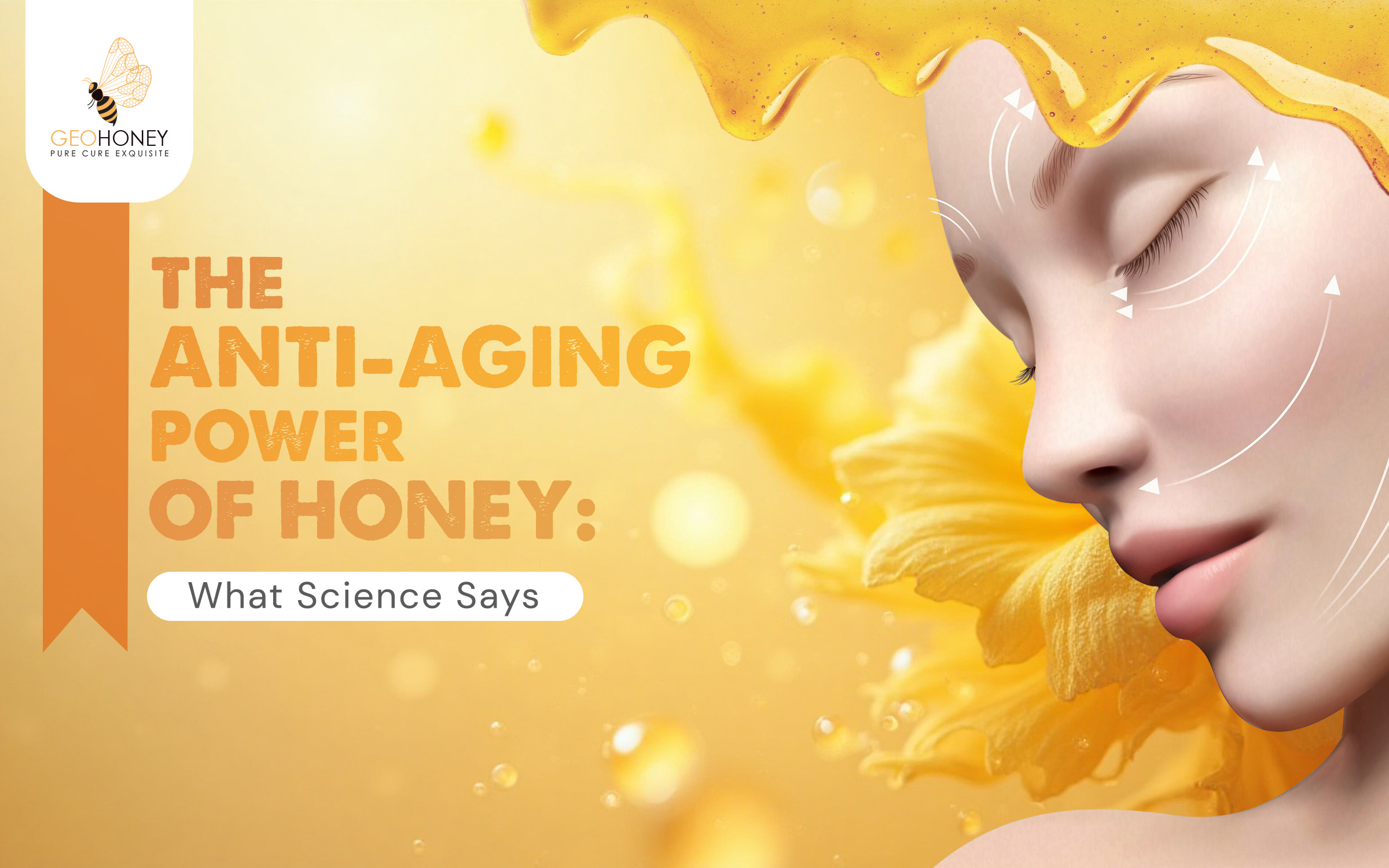
Geohoney
The Anti-Aging Power of Honey: What Science Says
The list of benefits of adding honey to your lifestyle and diet is pretty long. It keeps you nourished, helps you fight seas... read more
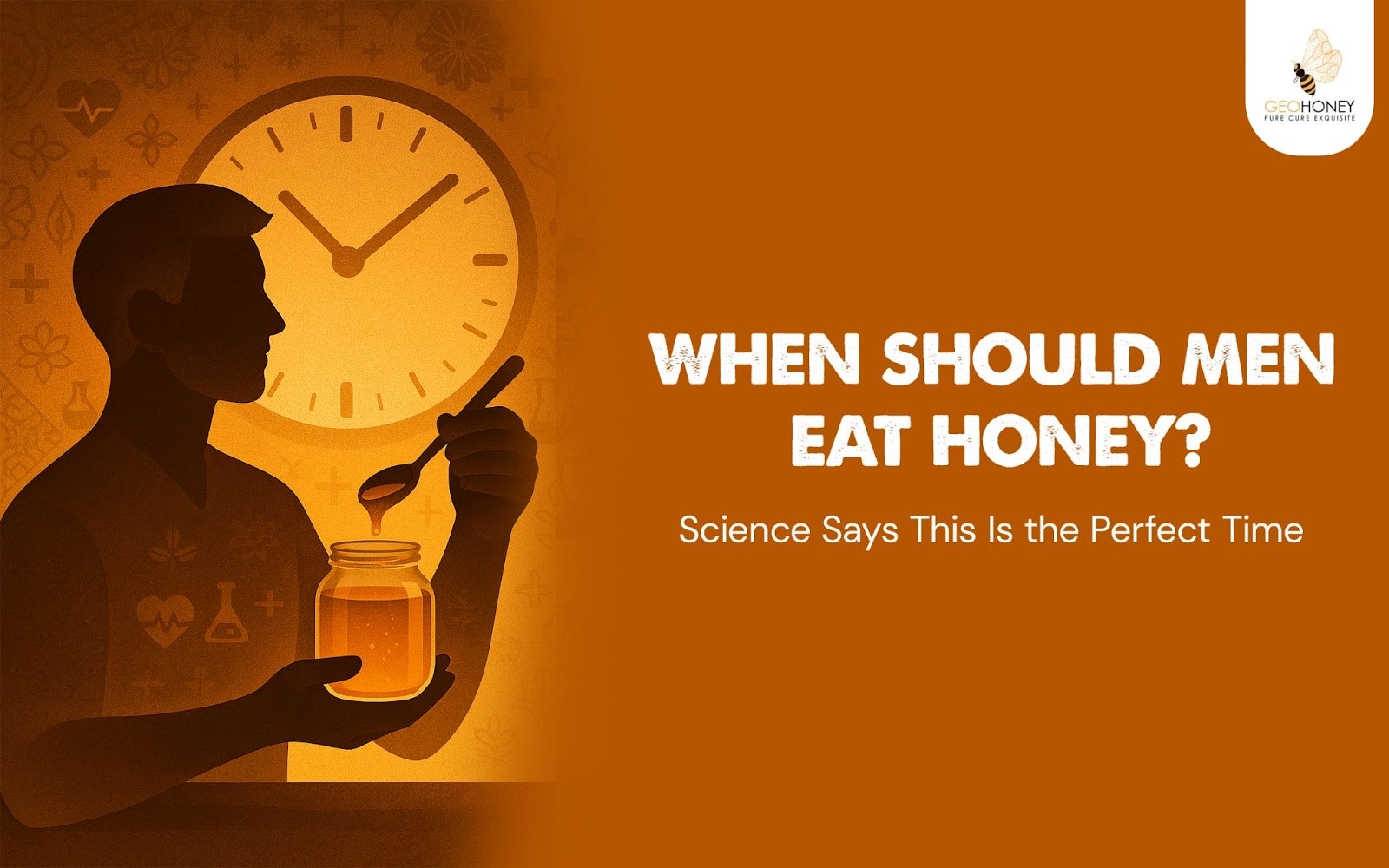
Geohoney
When Should Men Eat Honey? Science Says This Is the Perfect Time
Regular use of honey, nature’s delicious elixir, can be very beneficial for the overall health and well-being of men. If you... read more

Geohoney
Royal Honey for Women: Myth or Miracle? What You Need to Know
Honey, nature’s sweet wonder, is known all over the world for its amazing nutritional profile and countless health benefits.... read more
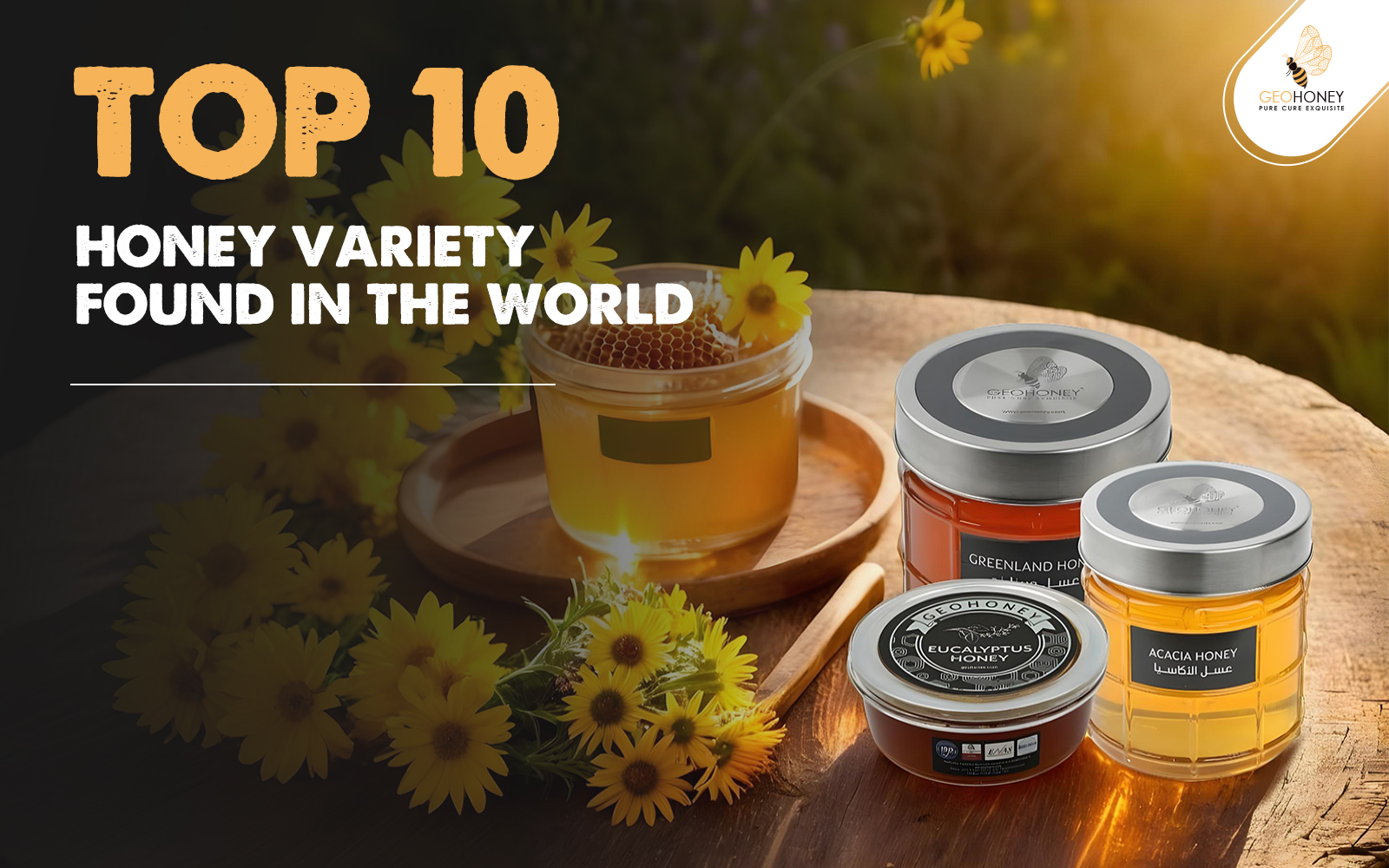
Geohoney
Diffrent Types of Honey Found in the World
Diffrent Types of Honey Found in the World Honey is available in hundreds of types, each with a distinct taste and nutritio... read more

Geohoney
Sidr Tree Secrets: The Ancient Plant with Modern Health Benefits
Sidr Tree, also known as the Lote tree, Christ’s Thorn, Jujube, or Nabkh tree is an extremely ancient and wondrous tre... read more

Geohoney
The Agritech Innovations Supporting Global Food Security
As the global population grows at an alarming rate, so do the concerns surrounding the sustainability of the food supply cha... read more

